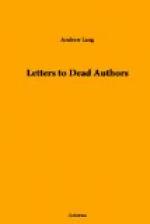Then I was brought to the priest who had a name for knowing most about Egypt, and the Egyptians, and the Assyrians, and the Cappadocians, and all the kingdoms of the Great King. He came out to me, being attired in a black robe, and wearing on his head a square cap. But why the priests have square caps I know, and he who has been initiated into the mysteries which they call ‘Matric’ knows, but I prefer not to tell. Concerning the square cap, then, let this be sufficient. Now, the priest received me courteously, and when I asked him, concerning Herodotus, whether he were a true man or not, he smiled, and answered ‘Abu Goosh,’ which, in the tongue of the Arabians, means ’The Father of Liars.’ Then he went on to speak concerning Herodotus, and he said in his discourse that Herodotus not only told the thing which was not, but that he did so wilfully, as one knowing the truth but concealing it. For example, quoth he, ’Solon never went to see Croesus, as Herodotus avers; nor did those about Xerxes ever dream dreams; but Herodotus, out of his abundant wickedness, invented these things.
‘Now behold,’ he went on, ’how the curse of the Gods falls upon Herodotus. For he pretends that he saw Cadmeian inscriptions at Thebes. Now I do not believe there were any Cadmeian inscriptions there: therefore Herodotus is most manifestly lying. Moreover, this Herodotus never speaks of Sophocles the Athenian, and why not? Because he, being a child at school, did not learn Sophocles by heart: for the tragedies of Sophocles could not have been learned at school before they were written, nor can any man quote a poet whom he never learned at school. Moreover, as all those about Herodotus knew Sophocles well, he could not appear to them to be learned by showing that he knew what they knew also.’ Then I thought the priest was making game and sport, saying first that Herodotus could know no poet whom he had not learned at school, and then saying that all the men of his time well knew this poet, ’about whom everyone was talking’. But the priest seemed not to know that Herodotus and Sophocles were friends, which is proved by this, that Sophocles wrote an ode in praise of Herodotus.
Then he went on, and though I were to write with a hundred hands (like Briareus, of whom Homer makes mention) I could not tell you all the things that the priest said against Herodotus, speaking truly, or not truly, or sometimes correctly and sometimes not, as often befalls mortal men. For Herodotus, he said, was chiefly concerned to steal the lore of those who came before him, such as Hecataeus, and then to escape notice as having stolen it. Also he said that, being himself cunning and deceitful, Herodotus was easily beguiled by the cunning of others, and believed in things manifestly false, such as the story of the Phoenix-bird.




